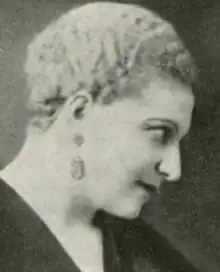Rena Pfiffer-Lax | |
|---|---|
 Rena Pfiffer-Lax, from a 1927 publication | |
| Born | October 5, 1893 Horodenka |
| Died | October 8, 1943 (age 50) Copenhagen, Denmark |
| Other names | Rena Madsen |
| Occupation | Soprano opera singer |
| Spouse(s) | Gabriel Lax, Jens Egon Christian Madsen |
| Children | Lily Greenham |
Rena Pfiffer-Lax-Madsen (October 5, 1893[1] – October 8, 1943), usually seen as Rena Pfiffer-Lax, was a Polish soprano opera singer based in Austria and Denmark, and associated with Viennese opera houses in the 1920s.
Early life and education
Rena Pfiffer was born in Horodenka, now in Western Ukraine, to Polish-Jewish parents.[2] She trained as a singer in Lviv and Vienna, with Edmund Walter and Gustav Geiringer.[3]
Career
Pfiffer joined the Vienna Volksoper in 1919. She gave performances in Dresden, Sofia, Lviv, Warsaw, and Budapest. The New York Times described her voice in 1927 as "lyric, of pleasing timbre, not as flexible as a coloratura, but her instincts are highly dramatic and she sings in a spirited manner."[4] Performances by Pfiffer included roles in Meyerbeer's Robert le diable (Vienna, 1921),[5] and Mozart's Die Entführung aus dem Serail (Vienna, 1918).[6]
In 1927 Pfiffer traveled to the United States, where she gave a recital at Aeolian Hall in New York, accompanied by Canadian composer Colin McPhee.[4][7] She made six recordings on the Brunswick label, including two duets with fellow soprano Lyubov Karina.[8][9]
Later in her career, Pfiffer gave radio performances, wrote concert reviews, and taught voice in Denmark; her students included soprano Inger Lis Hassing[10][11] and composer Benna Moe.[12] She traveled to Palestine in 1939, to give concerts and radio performances.[13]
Personal life and death
Pfiffer married twice. Her first husband was businessman Gabriel Lax; they had a daughter, Lilijana, who became an international visual artist, performer and composer. Her second husband was Danish singer Jens Egon Christian Madsen. She died at a hospital in Copenhagen, Denmark, in 1943 at the age of 50, from wounds sustained while trying to escape to Sweden during the Nazi occupation.[2][14] "Rena Pfiffer-Madsen is by far the most well-known person to have died during the Judenaktion," notes historian Silvia Goldbaum Tarabini Fracapane in a recent book.[13] The Danish gunman who shot her was convicted in 1949 and served almost five years in prison.[13]
References
- ↑ Some sources give 1895 as her birth year.
- 1 2 Ciwkacz, Olga, "Rena Pfiffer-Lax-Madsen, 'Kobiecy Caruso': Zarys Źycia i Twórczości" Colloquia Orientalia Bialostocensia 45 (2020): 46–55.
- ↑ Kornberger, Monika. "Pfiffer-Lax, Rena", Oesterreichisches Musiklexikon (2018), accessed March 15, 2023.
- 1 2 "Debut by Mme. Pfiffer; Soprano of the Vienna Opera Gives a Successful Recital". The New York Times. 1927-04-05. Retrieved 2023-03-16.
- ↑ Letellier, Robert Ignatius (2017-07-05). An Introduction to the Dramatic Works of Giacomo Meyerbeer: Operas, Ballets, Cantatas, Plays. Routledge. ISBN 978-1-351-57663-5.
- ↑ Jahresbericht (in German). Akademie für Musik und Darstellende Kunst in Wien. 1913. p. 166.
- ↑ Oja, Carol J. (2004). Colin McPhee: Composer in Two Worlds. University of Illinois Press. p. 30. ISBN 978-0-252-07180-5.
- ↑ "Rena Pfiffer". Discography of American Historical Recordings. Retrieved 2023-03-16.
- ↑ "Pfiffer-Lax Rena". Wirtualny Sztetl. Retrieved 2023-03-16.
- ↑ Rode, Edith (2018-02-16). Den gyldne bog om danske kvinder (in Danish). Lindhardt og Ringhof. ISBN 978-87-11-66775-0.
- ↑ Flor, Kai (2020-05-01). Danske scenekunstnere (in Danish). Lindhardt og Ringhof. ISBN 978-87-26-32612-3.
- ↑ Organ and Harpsichord Music by Women Composers: An Annotated Catalog. ABC-CLIO. 1991. p. 303. ISBN 978-0-313-26802-1.
- 1 2 3 Fracapane, Silvia Goldbaum Tarabini (2020-12-29). The Jews of Denmark in the Holocaust: Life and Death in Theresienstadt Ghetto. Routledge. ISBN 978-0-429-51486-9.
- ↑ "Chief Rabbi of Denmark Interned but Not Deported, Germans Announce; Terror Continues". Jewish Telegraphic Agency. October 17, 1943. Retrieved 2023-03-16.